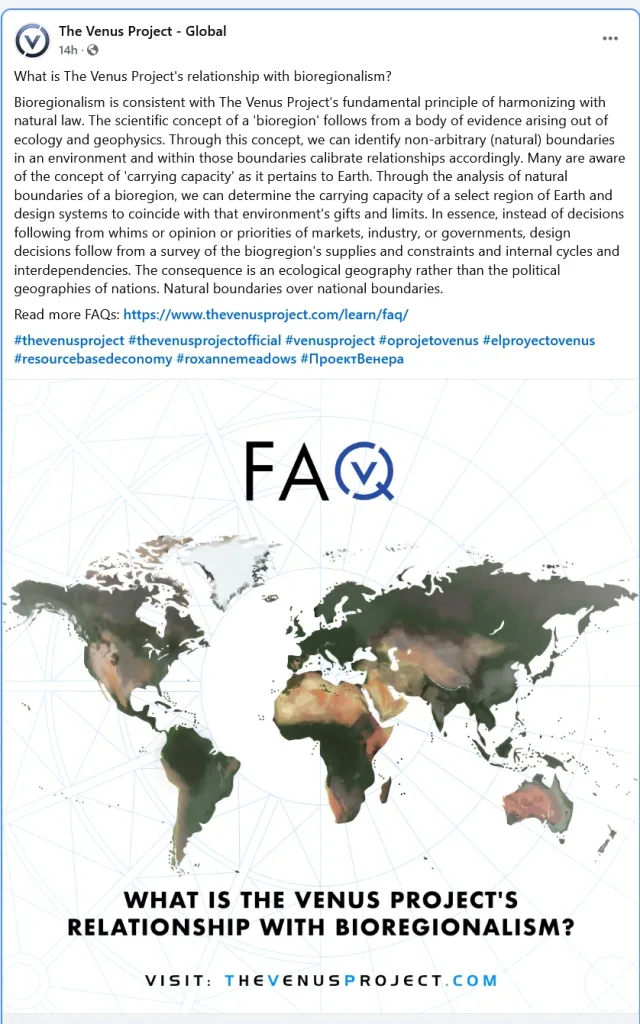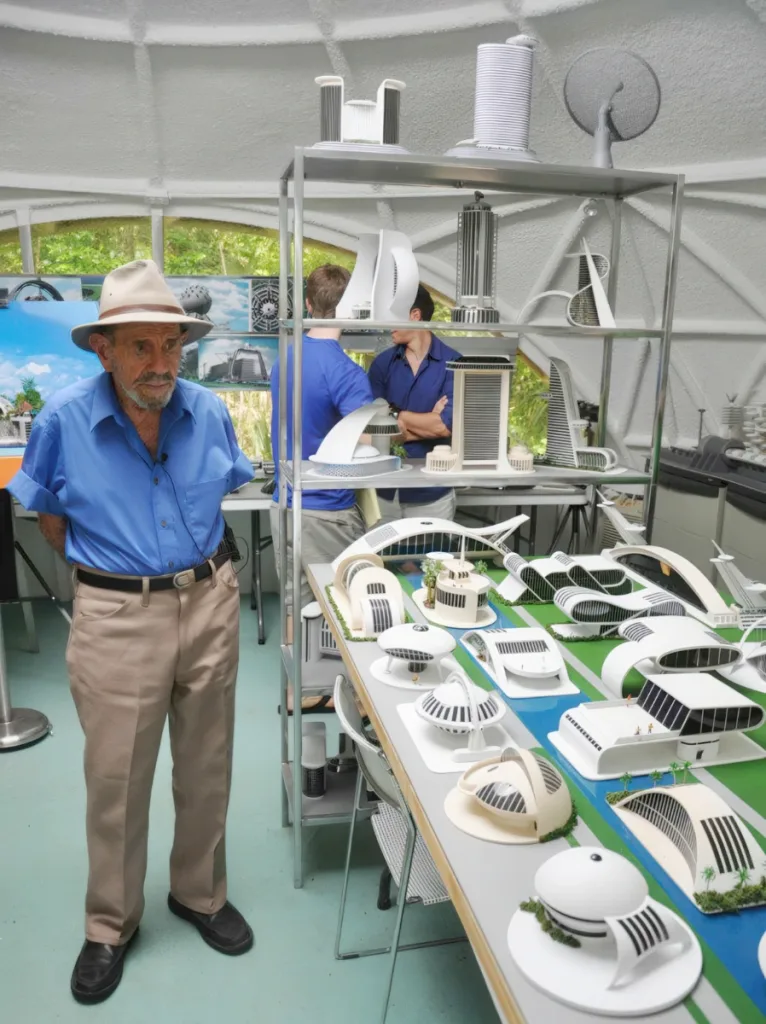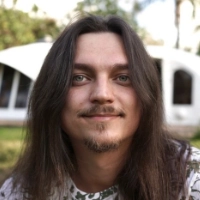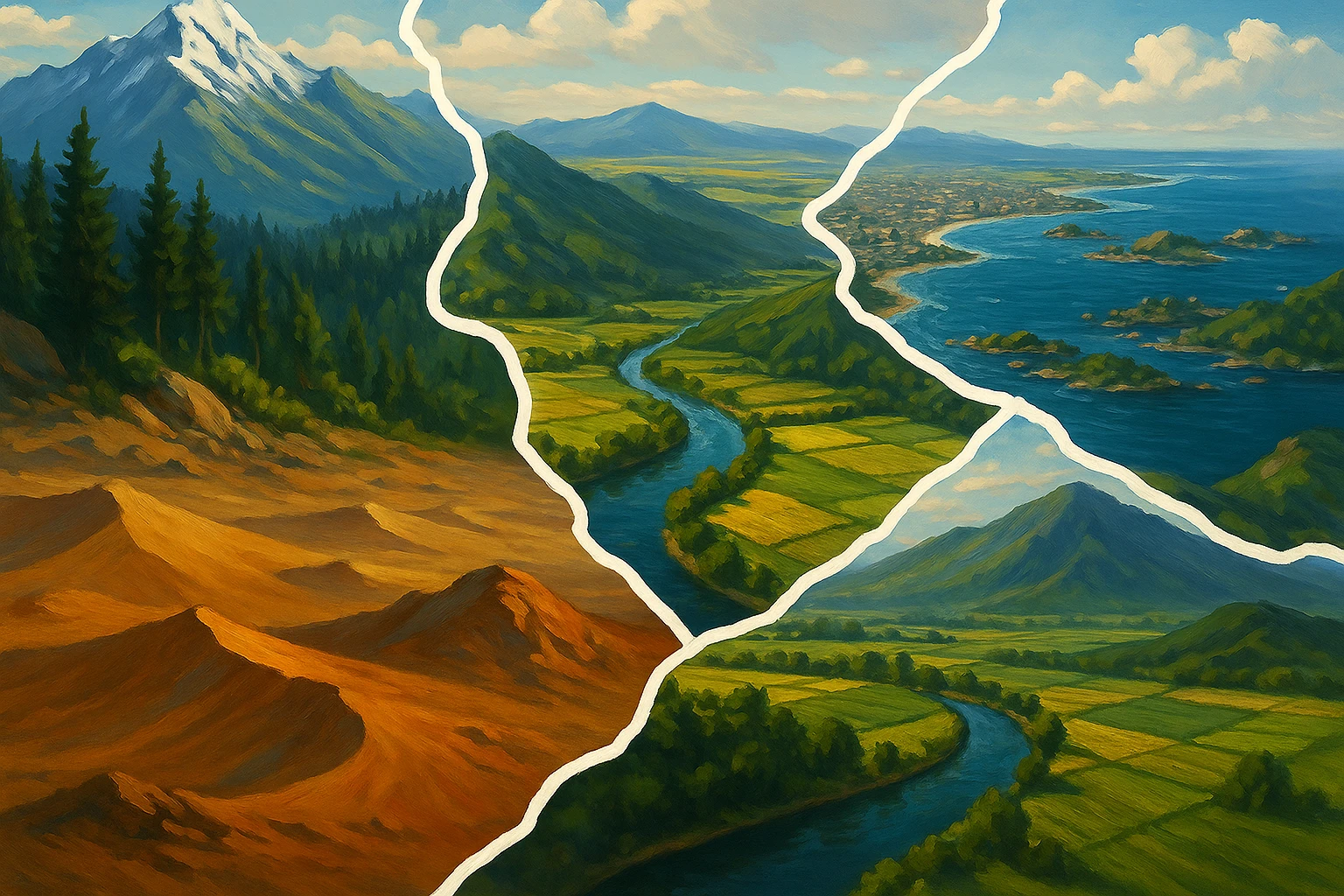Bioregionalism is often presented as an ecological approach, encouraging people to live within the boundaries of natural ecosystems and watersheds rather than within national borders. At first glance, the idea seems logical: align human activities with local environmental capacities, free ourselves from market and government dictates, and live in harmony with nature. But behind this appealing term lie serious risks. A recent post by the new Venus Project supporting bioregionalism provides a timely reason to explore why, in practice, this idea turns into an illusion of sustainability that leads to conflict, coercion, and systemic degradation.
The Venus Project’s View on Bioregionalism:
“By analyzing the natural boundaries of a bioregion, we can determine the carrying capacity of a specific region on Earth and design systems that align with the capacities and limitations of that environment… The result is an ecological geography rather than the political geography of nations. Natural boundaries instead of national boundaries.”
– From the completely updated FAQ of the new The Venus Project
The original FAQ with 108 questions is now available only on our website:

An Illusion of a Simple Solution
But how many regions should the world be divided into under this concept? Two, fifty, five hundred? Rivers and ecosystems rarely align with convenient lines on a map, while large cities often sit at the intersection of different ecosystems. Mountains and watersheds can create dozens of enclaves within a single country. Who decides where these lines will be drawn, and who enforces them on millions of people? These schemes inevitably lead to coercion and conflict, as some regions will demand resources from their neighbors, and refusal will lead to forceful seizures under the banner of “ecological justice.
Bioregionalism overlooks what has allowed humanity to move beyond isolation: global energy systems, transportation, communications, and international division of labor. We have built a system in which some regions produce medicine and technology, others provide food and raw materials, and energy grids connect continents, powering hospitals and factories regardless of local ecosystems. Attempting to “live within local resources” means dismantling these connections, returning to scarcity and isolation.
Even seemingly local issues like fisheries require international governance; otherwise, marine ecosystems will be destroyed. Agriculture in the Nile or Ganges regions depends on global trade in fertilizers, technologies, and fuel, not on “local self-sufficiency.” Bioregionalist proposals ignore these interdependencies, substituting real solutions with slogans.
Bioregionalism does not solve the problems of war and poverty; it creates new lines of conflict under the guise of “sustainability.” It does not eliminate scarcity; it demands living within its constraints. It does not build resilience; it destroys infrastructures developed over generations.
Furthermore, bioregionalism ignores the extreme inequalities between regions in terms of resources, technologies, infrastructure, and living standards. Some regions have abundant water, fertile land, and minerals, while others rely on imports for even the most basic goods. Some have advanced medical systems and technology, while others lack access to them entirely. Dividing the world by ecosystems cements these inequalities, turning them into a permanent condition. Instead of eliminating scarcity for everyone, it proposes to distribute scarcity, leaving some regions in abundance while others remain in chronic deprivation.
What Jacque Fresco Proposed

Jacque Fresco demonstrated how we could design sustainable cities without borders by using science and automation.
He spoke about the voluntary global unification of humanity to utilize the Earth’s resources for the benefit of all people, removing borders and scarcity through science, automation, and logistics. Natural zones and ecosystems should only be considered for designing cities and planning production, not for dividing people into enclaves.
Jacque Fresco often emphasized:
“We cannot solve the world’s problems within the framework of nations.”
“Borders create conflict, not solutions.”
“Science and technology are capable of eliminating scarcity if the resources of the Earth become the common heritage of all.”
The Real Solution: A Global System
The real solution does not lie in dividing the world and isolating people into fragmented enclaves but in building a global management system that eliminates scarcity and preserves ecosystems for the benefit of every person on the planet. Everything else is merely a rebranding of the same problems that have caused wars and poverty throughout history.
We live in a world where borders and scarcity breed war and suffering. New borders disguised as “ecological solutions” will not address these problems. The path forward lies in a global system that eliminates artificial barriers and scarcity, using science and technology for all people while respecting the environment. If you see this and understand that true sustainability is impossible without removing artificial barriers, join those who are working to build a real, not illusory, foundation for the future.
We continue to seek out and share solutions that truly work and move the world forward. Join us if you want to be part of these changes.
Read more:

I have been at the center of all this dirrection for over 13 years and can tell you a lot of things, from detailed explanation of Jacque Fresco’s original proposals, to experience of working with the movement, to little known and insider information.
I have organized the most successful and effective team of The Venus Project movement, now represented by Designing The Future, as well as the 1.5 million subscriber Jacque Fresco channel, small and large events, radio and TV interviews, working with universities and schools, organizing events, running a network of groups in 60 cities with regular meetings, and much more. Exposed and fought fraudulent companies and initiatives to protect The Venus Project’s reputation.
Organized and negotiated the construction of The Venus Project’s smart city, with the then living Jacque Fresco, which was their best chance. This has now evolved into a full-fledged smart city project and test site for the development of the entire industry of smart cities, called “Mission on Earth”, which will be launched soon, late 2024-early 2025, and we’re directly involved.
After the new directors of The Venus Project changed course, I strongly opposed it without hesitation, especially knowing the details of the gamble – taking the side of Jacque Fresco’s original ideas. Whatever the outcomes, I will continue what I have started, with the goal of giving humanity a chance to move toward a resource-based economy, or at least to point society in the right direction. I hope you will join us.

